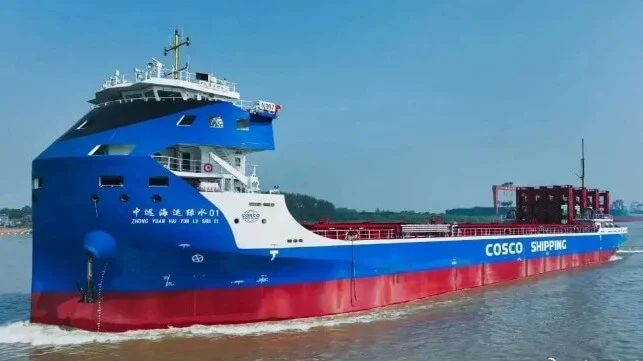Two battery-powered containerships which are being billed as the largest electric vessels yet constructed were officially named and placed into service in China today. Developed for COSCO Shipping, the two vessels are part of an effort to build an electrified network for shipping along China’s Yangtze River.
The ships can transport up to 700 TEU while operating fully on battery power. They use a swappable battery technology where the batteries are housed in containers that can be switched out when the power is depleted. The ships are currently outfitted with 24 batteries each in a 20-foot container and have the capacity to carry up to 36 units. The total battery capacity exceeds 50,000 kilowatt hours.
The vessels are reported to have a sufficient amount of battery power aboard to complete an entire voyage without having to recharge. They will be operated by Shanghai Pan Asia Shipping, a subsidiary of COSCO, on the Yangtze from Shanghai to Wuhan, a distance of over 600 nautical miles. The modular design of the batteries permits the vessels to swap out the depleted batteries for fully charged units so that their operations are not limited by charging time, low load capacity, or a short cruising range.
The vessels are reported to be 10,000 tons with a length of approximately 394 feet (120 meters) and a width of 77 feet (23.6 meters). Named COSCO Shipping Green Water 01 and 02, the ships are being billed as having the largest dwt, length, box capacity, and batteries of all the electric containerships built to date. They are also unique in their design with a certified capability to move between the river and ocean supporting a feeder network from inland manufacturing to the seaport in Shanghai.
In addition to using battery power, the Chinese are highlighting a broad range of advanced technology deployed on each vessel. They are reported to be built on an intelligent integrated platform with smart navigation and energy management integrated into the operations.
COSCO launched the effort to build the two ships in March 2022. The first steel was cut in December of that year, and by May 2023 both ships were under construction. They were floated in July 2023.
The ships will be used to demonstrate the potential for electric propulsion and battery power. They are part of a program that seeks to develop the Yangtze River Mainline Green Intelligent Ship network by 2030.

